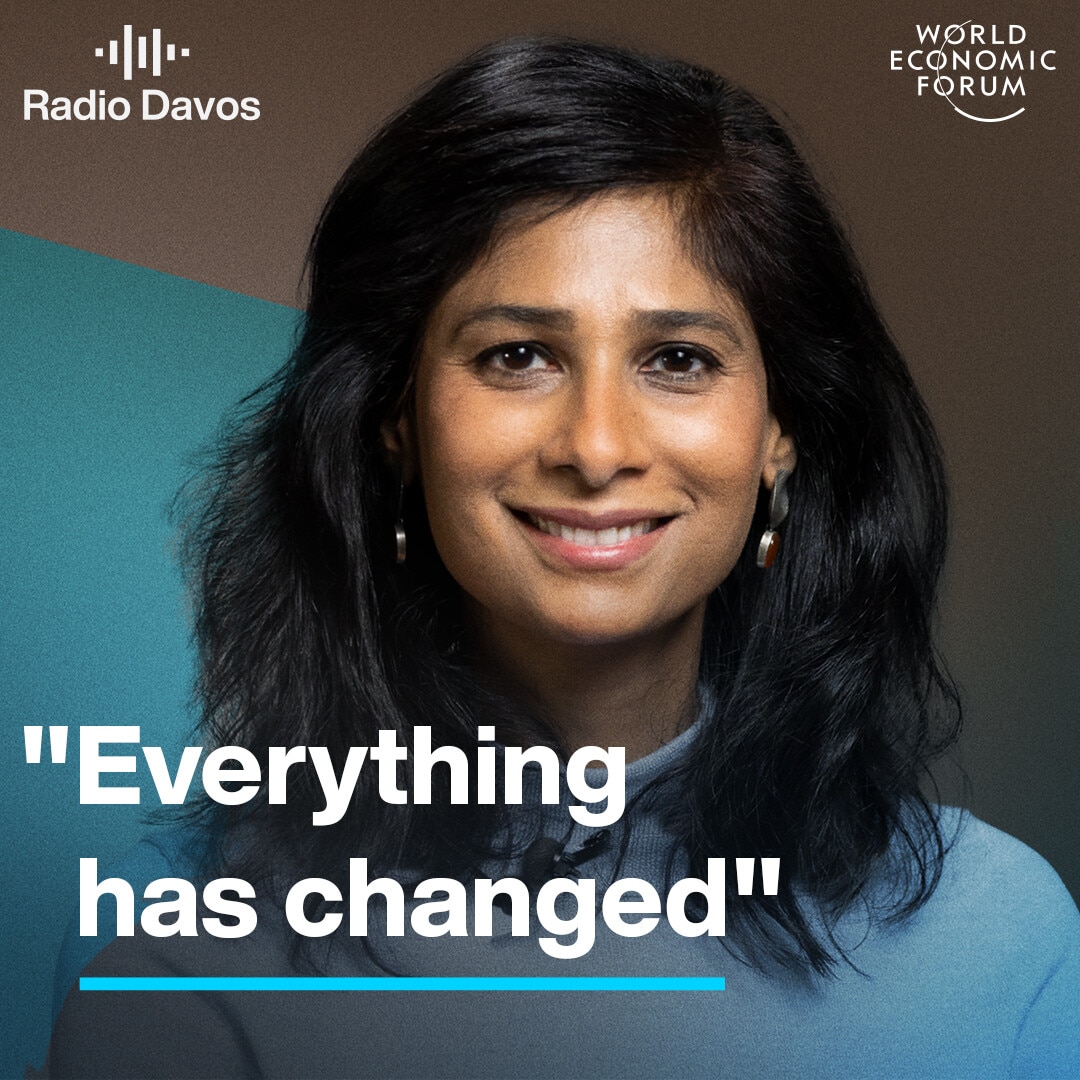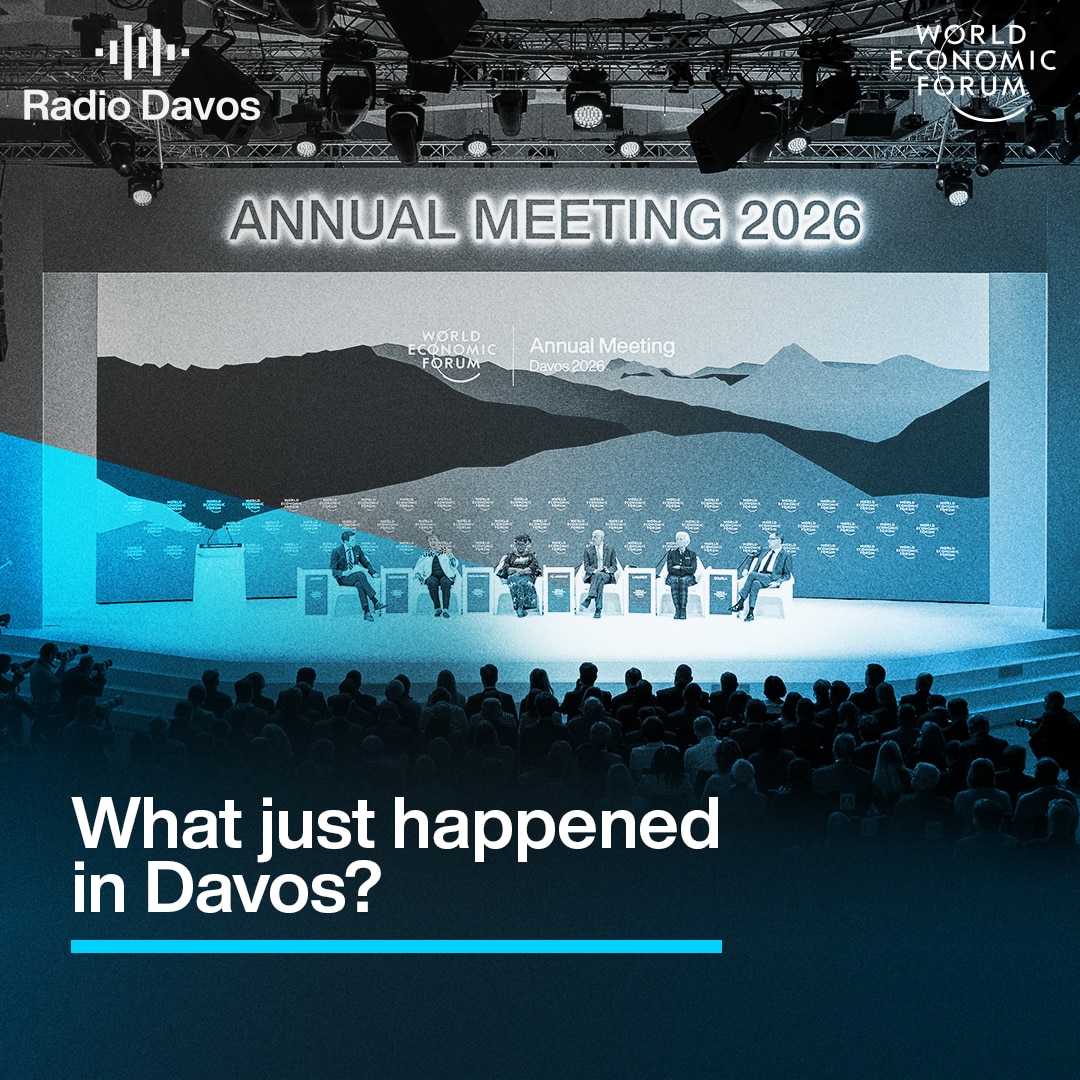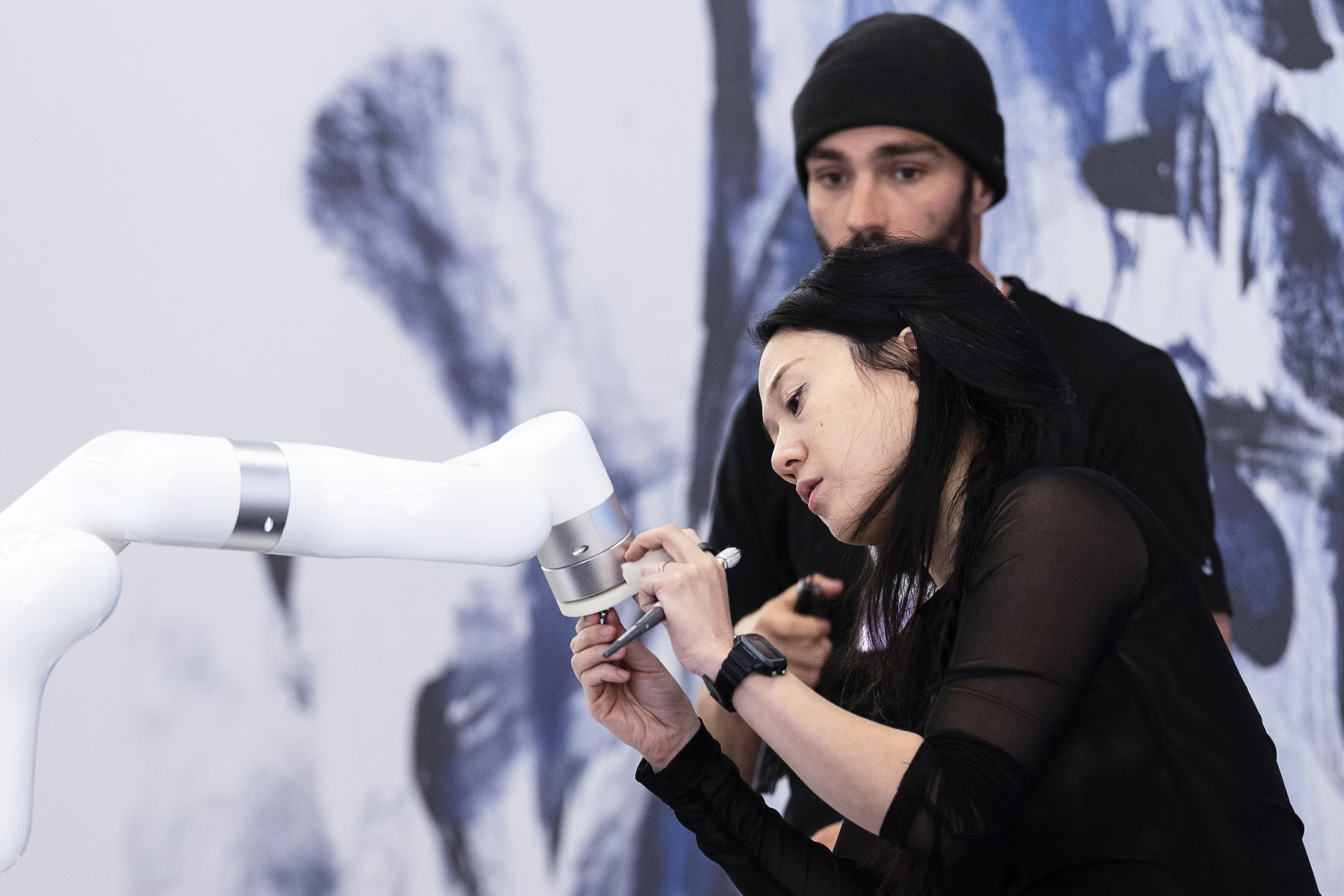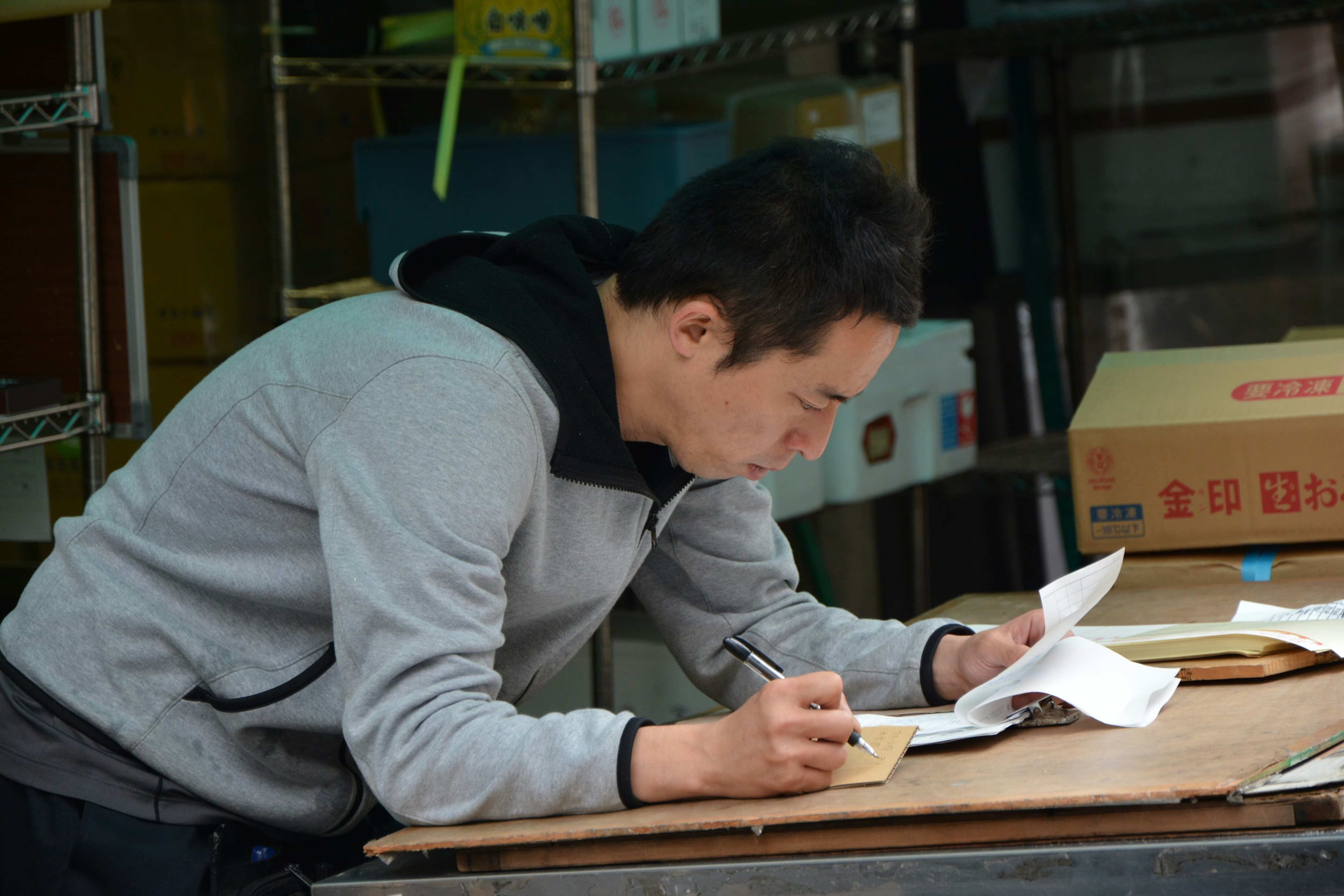The future of jobs requires a ‘skills-first’ mindset - for employers and for you
Transcripción del podcast
This transcript has been generated using speech recognition software and may contain errors. Please check its accuracy against the audio.
Saadia Zahidi, Managing Director, World Economic Forum: Employers simply have to think very differently about skills. Instead of relying on very traditional signals of what indicates a skill in a person: is it really where they got their degree from, what type of degree they had, or which workplace they worked in ten years ago? Or is it actually what they're able to demonstrate in the workplace?
Robin Pomeroy, host Radio Davos: Welcome to Radio Davos, the podcast from the World Economic Forum that looks at the biggest challenges and how we might solve them. This week: why the changing world of work demands a ‘skills-first’ approach.
Tan Kok Yam, Chief Executive, SkillsFuture Singapore: There's so much change in technology, in business models and so on, that that there is a need for enterprises, for individual workers, and for economy and society as a whole to continuously think about how then do I acquire new skills.
Robin Pomeroy: We hear from Singapore on how the government, business and individuals are working together to ensure lifelong learning.
And we speak to the head of Girls Who Code, an organisation that helps girls around the world get the skills they need.
Tarika Barrett, CEO of Girls Who Code: Our students come from very different backgrounds. Some dropped out of college, and some graduated from the Ivy League. But what matters to us most at Girls Who Code is that they all have equal access to opportunities to break into the tech industry.
Robin Pomeroy: Subscribe to Radio Davos wherever you get your podcasts, or visit wef.ch/podcasts where you will also find our sister podcasts, Meet the Leader, Agenda Dialogues and the World Economic Forum Book Club Podcast.
I’m Robin Pomeroy at the World Economic Forum, and with this look at the notion of skills first…
Tarika Barrett: These are young people who are the embodiment of bravery and resilience, the very qualities that we know these companies are desperate to have reflected in their workforce
Robin Pomeroy: This is Radio Davos
Wondering what job you’ll be doing in five years’ time? Chances are it may be quite different from what you do now, and you’ll need different skills. The transition to clean energy and the rise of artificial intelligence are likely to have a big impact on the world of work, so employers, too, need to adopt a ‘skills-first’ mindset.
Welcome to the second and final day of the World Economic Forum’s Growth Summit, and on this episode of Radio Davos, we are looking at the importance of learning new skills.
The Forum has just published a report, in collaboration with PwC, called Putting Skills First: Creating Access to Opportunity for All.
Later in this episode, we hear from a country that has put skills first and encouraged companies and individuals to upskill to meet the rapidly changing demands of the labour market. And we meet the head of an organisation helping girls and women gain the skills they need to join the high tech sector.
First though, World Economic Forum Managing Director Saadia Zahidi explains why we need a ‘skills first' approach.
Saadia Zahidi: So we find that when it comes to the skills churn or rather what amount of the current core skills of a worker today, what percentage of that is likely to change in the next four years, that's over 40%. That's nearly half of the skills that people like you and I are using every single day in the workplace. Nearly half of that is going to have to change in the next 4 to 5 years alone.
Now, what that means is we need very rapid reskilling and upskilling possibilities. A lot of workers can be self-motivated and will do that, but in many cases, it's employers themselves that are going to need to provide that reskilling and upskilling. And in yet other cases, it's going to be governments that are going to need to provide a lot more support.
But there's another angle to this, which is employers simply have to think very differently about skills. Instead of relying on very traditional signals of what indicates a skill in a person. Is it really where they got their degree from, what type of degree they had, or which workplace they worked in ten years ago? Or is it actually what they're able to demonstrate in the workplace?
And so if employers take a more skills-first approach when it comes to hiring, retention, promotions, they'll actually be able to assess people on the basis of what they really know and what they're able to do. They're also able to then target much more specifically their reskilling and upskilling programmes.
And then the other big win out of this is that if you pull the skills first agenda forward and move a little bit away from university credentials and other more traditional signals, many more people have an opportunity because it doesn't mean that we're limited to the pool of people that have been to a specific type of degree or accreditation. And there's no evidence that people that haven't been to university aren't able to reskill or upskill towards very specific areas that companies need more talent in.
So it solves a lot of problems at the same time, provides upward social mobility, helps companies find the right talent, and allows governments to focus much more on broad-based prosperity rather than more limited support for specific parts of the workforce.
Robin Pomeroy: World Economic Forum Managing Director Saadia Zahidi.
SkillsFuture Singapore is a government agency that seeks to promote upskilling and lifelong learning. I spoke to its Chief Executive, Tan Kok Yam, and asked him what he understood by the phrase 'skills first'.
Tan Kok Yam: I think when we look at the term skills first, I think we can take it maybe at three different levels, three different aspects.
I think at the broadest level, the economy level, we are looking at an economy, a labour market, that is effective in organising itself to acquire the skills to be able to deal with constraints, overcome the challenges of growth and to seize the opportunities.
So, for example, you look at something like the green transitioning, something that affects all economies, all societies everywhere. How then is a skills first economy able to organise itself to equip its workforce with the requisite skills to deal with everything from vehicle electrification to better ESG reporting, to use of hydrogen fuel. So that's at the economy level.
Now, at the employer level, I think skills first is about an employer and enterprise being able to associate or link its business objectives, its growth strategies with capabilities and with the skills bank that it needs to acquire and build up. So then with that sensibility, how then can the skills first enterprise, then either by hiring the appropriate workers from from the market or by increasing the skill stock of these existing employees, be then able to meet those growth challenges or those capabilities?
Robin Pomeroy: We've always needed certain skills through history. And so employers would always be looking for those skills. What do you think has changed now, that we think maybe there's a mindset change needed for employers and employees, that skills are the thing that needs to be front of mind? What has changed? What's different now from, let's say, even ten years ago?
Tan Kok Yam: I think the cadence of technological change is much faster now. And if you look at that, I think you're all familiar with the report that talks about the half life or the shelf life or skills going to five years, the last few months have been the whole world talking about ChatGPT and crop engineering, who knows what comes next.
So it's not so much whether crop engineering or ChatGPT will change the way we work, it's the fact that there's so much change in technology, in terms of business models and so on, that that there is a need for enterprises, for individual workers, and for economy and society as a whole to continuously think about how then do I acquire new skills to be relevant, to overcome challenges, to continue to seize opportunities for growth together?
Robin Pomeroy: It's a really interesting term you've used there, the 'half life' of skills. It's quite scary that you can skill up, but those skills will have a duration and longevity just so much. And we don't know what it is because what will be that next technology? Already with ChatGPT it can do some of the things I do, maybe some of the things you do.
Anyway, I'd like to talk about how has Singapore positioned itself on this. Could you tell us what is SkillsFuture Singapore that you've led?
Tan Kok Yam: At one level SkillsFuture Singapore is an agency under the public sector and we look at the fiscal investment that the government has put into what we call continual education, upskilling for adults and so on, and we use that resource to create capacity to improve the quality of adult education or continual education.
So that's at one level, it may not be the most important thing, but it is important enough as a starting point that the government, the state, provides the fiscal support to enable capacity for learning beyond formal education.
Robin Pomeroy: The state has put in incentives for the market to provide that education, that upskilling, for adults, people who have left formal education.
Tan Kok Yam: That's right. Subsidies. So we have both what we call the supply side subsidies, where we fund training providers, including universities, polytechnics directly. And we also have something called a SkillsFuture credit, which is a demand site lever, given to the individual so that he can choose the how to use that credit for his learning.
And that comes to actually my second point, which is that beyond the fiscal investment. SkillsFuture also needs to be a societal movement, if you like, where individuals are seized with the idea of continuously improving their own skills capital, of looking ahead and saying, okay, where, where can I view myself up so as to be ready to either transit to a new new sector or to deepen and be more visible in my own sector.
Companies too, enterprises too, need to be in the game, first of all, to be able to recognise skills and also then to encourage and to enable their workers to be able to have opportunities in the workplace and beyond.
Robin Pomeroy: If I came to Singapore and met some individuals or talked to some businesses that had use this skills first approach, could you give me some examples of the type of people I might meet or the type of companies?
Tan Kok Yam: Let me just use some examples during the pandemic period. So you would have someone who might come from a sector who was a bit under stress during the pandemic period, maybe food and beverages, F and B sector, and he would have maybe taken part in a career transition program. This is a six or nine month program where he learns the necessary skill sets to be able to transition to a different sector. That would be one example of someone that have benefited or have taken part in a sort of upskilling initiative.
Of course, on the other end you would have people who will participate in shorter courses: three day, five day courses, green reporting how to measure your carbon footprint and so on, and maybe the boss will send someone to say, Well, maybe you should learn about it because because I need to export my goods all over the world and I need to be able to report this properly. It's a capability that the enterprise needs. Maybe just at a 3 to 5 day kind of depth, a bit more bite size. So upskilling, so, a different depth of experience.
Robin Pomeroy: So Singapore, you've been doing this for a number of years. What are the learnings that you could give to other governments, to companies, to individuals to reorient themselves towards skills first?
Tan Kok Yam: I think one of the most important elements of doing this well is that employers, enterprises, absolutely need to be involved. At the end of the day. It is not about attending courses and being able to distribute certificates and so on. Those are currency that will have no meaning and no value if it is not recognised in the job market by employers.
And the way then to involve employers is to give them some skin in the game, push some of the leading what we call industry captains and ask them if they are willing to lean forward to look after their sector or place in their value chain. Look at natural aggregators such as trade associations, for example, and see whether they are able to bring in their SMEs to aggregate their skills needs and so on.
So different ways to engage. But I think the more important point is that employers absolutely need to be involved in the whole process of developing all the content for upskilling, the content for for adult education.
Robin Pomeroy: And this is being discussed in this in this paper from the World Economic Forum and at the Growth Summit. How fundamental do you think skills are and the skills first approach is for growth, for economic growth and the development of an economy and a country?
Tan Kok Yam: Absolutely important. And there are two reasons. The first, this cadence, this rate of change. Look at the green transition. We look at rapid digitalisation and may I add a third one, which is the ageing demography I think requires different skill sets in the economy, in the workplace, in society to be able to handle that.
So that's one aspect. The second aspect, and in fact it is quite timely because actually my deputy prime minister just mentioned that in parliament, less than 24 hours ago. And let me just look at the quote so I get it right. And he said, you know, we should strive to be a meritocracy where everyone can be the best possible version of themselves.
And this striving has to go beyond formal education, this sense that you can still progress and you are still able to go for opportunities, can upskill yourself, and you are not limited by what you graduated with or graduated wihout. That has to be part and parcel of an inclusive workforce and inclusive society.
So if you ask how important this is, I would say it's fundamental.
Robin Pomeroy: Tan Kok Yam, Chief Executive of SkillsFuture Singapore.
Another organisation putting skills first is Girls Who Code which, as its name suggests, helps girls acquire the skills needed for computer coding. My colleague Juliet Masiga spoke to its Chief Executive.
Tarika Barrett: My name is Dr. Tarika Barrett, and I'm so proud to be the CEO of Girls Who Code. We're an international non-profit organisation working to close a gender gap in new entry level tech schools by 2030.
And we're leading the movement to inspire, educate and equip students who identify as girls or non-binary with the computing skills needed to pursue 21st century opportunities.
Since launching in 2012, it's actually been more than ten years, we've reached over 500,000 students with our programming, 115,000 of whom are college and workforce age alums.
And for us, by addressing this growing gender gap in tech, we're empowering our young people to seek out the thriving and exciting careers of the future, the ones that are going to afford them the upward mobility and improved quality of life that come with a career in tech.
And at Girls Who Code we know how important it is to meet our students at every phase of their computer science journey so that we can support them through the tech pipeline successfully. And we offer clubs for students as early as third through fifth grade and sixth through 12th grade. And our clubs are free and they allow students to join this beautiful sisterhood of supportive peers and role models where they not only learn computer science or a flexible curriculum, but they get a chance to really connect with each other.
And these clubs take place after school, on weekends, during the summer, and they can be held completely in person or online. And for high school students who want to do more and who are interested in spending their summers with us, we offer what we call a summer immersion program, and it's a two-week intensive and it's open to students from grades 9 to 11, as well as 12th grade alums of ours.
And if you can picture this, these are live virtual classrooms and they get a chance to hear from industry leading professionals at top companies, and they get access to leaders in computer science, and they have mentorship opportunities along with the essentials of CS.
And then it doesn't stop there. I know that I've been sharing a lot about our programming, but we have more. We also support college and career age students, and we do that through a host of different things, including hosting hiring summits where thousands of students can learn about internships and job opportunities in the technical workforce, and where we also get these hiring managers from our top companies to connect with a diverse slate of candidates for internships and jobs, often students who they wouldn't typically consider. And students themselves get to hear directly from these hiring managers and recruiters, and they get a chance to meet so many employers that they wouldn't necessarily look at themselves.
And these are often quick chats, and dozens of our partners participate in recruitment events. And we have this wonderful track record of success.
And the last thing I'll tell you about is, and we have more programs, and this is that we launched the Leadership Academy, which is a four-month pilot program in 2022 with one of our top partners. 90% of our leadership Academy students come from historically underrepresented groups, and they do so much together in small groups. They meet with career advisors who help them explore their path forward in the tech industry, they attend hiring fairs, speed networking events. They meet other technologists. They even participate in a technical interview prep bootcamp, and they get a chance to be a part of webinars where they explore so many different topics.
All of this I share with you is that we are so deeply committed to making sure that we give our students incredible insight into the tech industry and that we give them real world applications in terms of their skills.
And there's no better way to do that than to offer them access to tech companies so they can see for themselves how they work.
So anyone listening to this interested in learning more about Girls Who Code or want to join our community, they can go to GirlsWhoCode.com and you can find information and all of these incredible ways to get involved. Whether you're a student, a teacher, you can start a club or a college group or just join us for our 2023 summer programs.
So let me pause because I shared so much with you, but at least you have a sense of our program.
Juliet Masiga: Given that it's highly online based or has aspects of digital learning, are there any plans to take it around the world, outside the US?
Tarika Barrett: That question is a tough one because before the pandemic Girls Who Code, I mentioned, it's an international program. And just so you know, we were really, really expanding at a pace that we were so proud of and that we were so excited about. We had clubs, I think over 700 clubs in the UK, Canada and India as a start.
But what was really challenging, and I know this is true for so many organisations that are domestic, is that the pandemic really curtailed our efforts. Because, as you might imagine, bringing our free after-school clubs model to those spaces across the world, we saw that in the US we couldn't move forward because everything shut down. And so we had to rethink a lot of our international programming.
We're still committed to this and we think we've come up with a solution for now that still meets our goal of making sure that girls around the world fall in love with computer science. And right now I mentioned our summer immersion program, but what I didn't share with you is that it's open to our international students as well. So if international students are interested in doing that two-week intensive, they can go to GirlsWhoCode.com and learn more about it. We have students from so many countries. All we ask is that they have wifi to be able to participate and that they are comfortable with English because that is how it's being taught at this time. We have in the past have had some of our materials translated, but we want to be completely transparent and say that this is ongoing work because so much was upended because of the health crisis.
Juliet Masiga: So at the Forum, we're working on a Skills First report and we're doing a lot of work around upskilling, reskilling and centring skills in addition to education and experience. So what does a skills first approach mean to you coming from the Girls Who Code space and all the work that you're doing?
Tarika Barrett: So many of our girls go on to do incredible things within the tech industry and it's beyond exciting. And I want to be transparent and say that our students come from very different backgrounds. Some graduated from two year or four years schools. Some dropped out of college once they got their first internship. And some graduated from the Ivy League. But what matters to us most at Girls Who Code is that they all have equal access to opportunities to break into the tech industry.
So for us equipping our students with the skills while encouraging them to integrate them with their passions has proved to be very successful as an approach for us as an organisation.
And at Girls Who Code we know that there are many rewarding path to a tech career and our girls are prime examples of just how diverse that can be within the industry. I'll share a couple.
So we have one Girls alum Karina Popovich. She founded Makers for COVID-19, an initiative to 3D print personal protective equipment or PPE materials for medical professionals on the frontlines of the fight against COVID 19.
And we know that STEM can offer pathways to creativity. Most recently, four of our Girls Who Code alums created an augmented reality Instagram filter to honour the legacy and artistry of Chadwick Boseman in partnership with Meta and the Chadwick Boseman Foundation ahead of the premiere of Wakanda Forever.
And we have another one of our alums who opted to pursue a degree in computer science while minoring in art after she realised she's passionate about art as well. And she's currently working at Disney for Marvel's art division.
So while we give all these students, these girls and non-binary students, the skills they need to successfully take on these technical challenges, it's also about them understanding how those skills work with the things they are already excited about in their own lives.
And there're many pathways into STEM and whether students want to work in the medical field or for a tech company or creative team, there's space for them to pursue these avenues that excite them, knowing that they're doing this work that makes it worthwhile for them and leaning on those skills that they gained.
So we think about this mashup of skills and passion because that's so important for our community.
Juliet Masiga: You took the words right out of my mouth. I was about to ask you, can you give me some concrete examples.
Tarika Barrett: Because our girls need them, right? When sometimes you're talking about these abstract things with the community and they're trying to understand, what are you talking about? What does this look like for me when I'm interested in this or that?
And so I offer those young women and their stories because those are often the kinds of things that excite our young people, and they sometimes don't see themselves reflected in an industry that can often be very white and male as presented to them. And that's why we're constantly changing a culture that tells them that they don't have a seat at the table.
Juliet Masiga: And it's interesting to see the intersection between STEM and the arts, like tech skills at Disney with a Chadwick Boseman project. So it's not isolated and it's very holistic. So why do you think it's so important right now? Why do you the skills approach is gaining currency much more than it had ten, 20 years ago? What's changed?
Tarika Barrett: That's an excellent question about why now and why this moment to focus on a skills based approach. Tech, as we're experiencing it now, has an outsized influence on our lives, and that impact is continuing to grow.
If you think about it, from voting rights to health care to safety and security to banking, nearly every aspect of our lives now has a connection to tech that we can't ignore. We cannot opt out of tech. We're way past that point.
And so it's more important than ever that the people creating the tech we use on a daily basis reflect the diversity of our communities and the world we live in today.
And I'm talking about not just more women, but also more black and brown people, more people from the LGBTQ community.
Diversity in tech is an urgent issue and we need to treat it as such. Our communities are going to be safer, more secure, and more able to reap the immense benefits of quality tech if our young people have a seat at the table.
And that's why we focus on a skills first approach at Girls Who Code.
More than half of the students we serve come from historically underrepresented groups. These are young women who look like me, who grow up like I did, potentially. Frankly, my grandmother actually worked on a family farm and had to drop out of school to help take care of her siblings. My mom was the first in our family to get a graduate degree. And these are young women who are motivated and ready to learn but don't often have the same resources or opportunities as their peers. Their circumstances might cause them to work multiple jobs while carrying a full college course load. They might be balancing homework with caregiving responsibilities, often not having access to the resources they need to succeed.
These are young people who are the embodiment of bravery and resilience - the very qualities that we know these companies are desperate to have reflected in their workforce, but don't always show up in conventional academic credentials at tech firms, overwhelmingly rely on.
And for many prospective students, this is discouraging. Computer science is one of the fastest growing professions in our country. It's expected to grow 11% by 2029, which will translate into a half a million new jobs in our economy.
And as we think about this, we know that we cannot afford to leave an ounce of tech talent on the table. And one tangible and feasible change that all companies can make is to stop relying on this elitist system of academic credentialing and hiring, which often offers a very narrow and privileged perspective around success. And it shuts out historically marginalised students.
And so we wonder why we fail to bring much needed diversity to these tech companies. And a focus on four-year university education, typically from Ivy League institutions, it keeps hurting our young people in our companies overall. And many of our students don't have the opportunity to study full time, which is why they find themselves gravitating toward the flexibility that non-traditional options like bootcamps and certifications offer.
Then we are ensuring that they won't be penalised for how they've acquired their skills, which is such an important point for the industry to pay attention to.
Juliet Masiga: I can relate to the diversity aspect of what you're saying. Being African and a woman, I understand how you need support to gain access to these spaces, so that's really, really exciting to hear. I see previously you've worked in the mentorship space. What are some of the interesting intersections between mentorship and the skills first approach? How do they like a happy coincidence?
Tarika Barrett: That's such a good question. I don't think anyone's ever asked me that before. I think that when I think about a skills first approach and mentorship, I think what's really beautiful about mentorship relationships often is that you hear directly from people and their own personal journey.
And when you think about it, especially when you look at women and people of colour in tech, very often they were either discouraged very early in their CS journeys in terms of pursuing the field or they didn't end up starting in tech. Very often the stories are ones of resilience where they may have taken computer science in undergrad, but they didn't see people who look like them, so they didn't take the next level up. Or they started it as a company doing one thing. But their interest was piqued and they sought out other champions and mentors and they pivoted and then sought out a tech career.
I mention this because mentorship often allows for the unveiling of stories and journeys in a way that can be deeply transformative for young people. They hear directly from people who look like them and who have journeys that they hope to emulate, and that can often lead to inspiration and having them realise that it doesn't have to be linear, that you don't have to have checked every box to have a seat at the table within the tech industry, that you can come to it later. You can explore in different ways. You can go through traditional pathways like a college degree in computer science or a related field, or you can come to, as some people do, through these alternative opportunities.
So I do think the happy intersection is one where hopefully more and more stories get surfaced about people who are diverse within the industry and that young people get a chance to understand those journeys and pathways into tech.
Juliet Masiga: Awesome. I'm just thinking that you support these girls a lot on their journey into the corporate world. Once they get the job, is there support then? Like to career advice and mentorship in the workplace so they can also have access to better jobs and promotions and career development?
Tarika Barrett: Such a powerful question that you're asking about what supports exist for young people because that's a serious issue. Because here we are, right? We've reached over 500,000 students with our programming. What happens next? How do we cement these pathways into tech?
We know that, Girls Who Code did a study with Accenture that found that 50% of women leave the industry by the age of 35 because they didn't find it to be hospitable to women. And so when I think about what that looks like, it's really important to speak to the industry directly about what needs to happen.
And when I think about that, we have to prioritise initiatives that educate students about the many pathways for them to access companies looking to hire and connect them with mentors.
We, Girls Who Code, have a number of strong partnerships with tech companies as well as with the government, and especially through the Cybersecurity and Infrastructure Security Agency or CISA. And it's important for us as an organisation to collaborate with those who are building the next generation of the tech workforce. And our partnerships not only cement our commitment to supporting our network of college age alums, but they help ensure that students maintain career momentum and continue to build their networks, which we know is so important for a young person.
And one of the things that happened a few years ago during the pandemic, we surveyed our community and we learned right away that 30% of our alums had internships or jobs rescinded and 40% of our seniors were still looking for full time employment because of the health crisis.
And we launched a number of different initiatives, but one of the ones we launched was called Work Prep, which is a two-week virtual pre-internship program designed to introduce college age women to career pathways in tech by immersing them in a partner company and providing project based experiences to develop career readiness and technical skills.
And by all accounts, this these pilots were immensely successful. Over half the participants said that they were more likely to continue to pursue their technical degrees and would go on to pursue a career in tech as a result of the program.
And this is the kind of program that was also designed with an eye to the challenges that our young people from underrepresented groups were facing, especially our women of colour, and they were the ones that had the biggest gains from these companies in terms of these skills and their interests.
And companies that support these types of efforts provide that critical early exposure and opportunities that get these young people prepared for the workforce.
But the other thing, because you asked about what needs to happen within these companies, I want to start with the first thing that happens in terms of the search.
Employers need to broaden the scope of where they look for strong candidates. Not everyone needs a computer science degree to cultivate the necessary skills to be successful in tech. We have several nonprofits like Empower, providing working adults the opportunity to pursue tech certification and providing free access to tech education and skills. We need more of that. And additionally, we know that top universities get all the attention from the recruiters. But what about our community colleges and our state schools? I myself went to a City University of New York school, Brooklyn College, alongside so many other students from working class backgrounds. And that's why we're focusing so much on workforce development initiatives that give our students direct access to top companies.
For example, since the pandemic started, we hosted four all-virtual hiring summits that featured thousands of young professionals, half of them, as I mentioned, from historically underrepresented groups. And we connected them with dozens of companies that were open to the unique qualities our students embody.
And these are students who some of them were entering their third year of school in a pandemic. Juggling work and school and caregiving and the workforce feels so uncertain. So we have to think about how to support them.
And not only is it about supporting them, it's about making sure that the workplace is inclusive.
And that means that at Girls Who Code we try to encourage these companies, once they try to think about their hiring practices to look at what they're doing, that might be alienating young people and especially people of colour and young women in terms of staying at the company.
And very often it can be daunting, right? There's no magical blueprint for this type of process, but we hope that companies pause and reflect on their work culture, thinking not only about at the beginning of the stage what is an appealing hiring candidate, but they also have to assess their promotion practices.
What's keeping women and people of colour out of these key leadership positions? And while we know this kind of self-reflection is difficult, it's going to be the difference between an all white male office and an office that more accurately reflects the world we're living in today.
And any efforts to tackle systemic racism and sexism, the root cause of a lack of diversity in tech will be met with resistance. But we have to persist because we have so much to gain from a diverse tech industry, and we have to move beyond treating, hiring and promotion as a challenge to fill diversity quotas. We need to fold in the systems of support that your question really gets at.
We know how critical it is for young people to feel supported in their first job and how they frame their perspective on their careers for years to come based on that experience. And the last thing we want is for them to become so jaded with the industry that they simply opt out.
Give you one last example. We had our first hiring summit during the pandemic, and we had one of our companies hire 17 young women from that event. But they didn't stop there. They didn't just hire them. They created an internal community of support, a program for them with a focus on retention. They made sure that these girls who code alums, they would find the sisterhood, the community that led them to pursue tech, and that they would stay engaged.
That same company to date has hired more than 100 Girls Who Code alums because of this deep commitment. And we're so proud of this effort.
And that's the kind of forward thinking we want to see from our companies, not just embracing a skills based approach, but thinking about diversity and support in a completely different way.
Every company is different, but offering this mentorship and community are great places to start.
Juliet Masiga: As you speak, I'm getting a great sense of the impact of your work. It's very impactful. Do you think there's room for governments to come in and partner with the private sector for girls who have skills-based credentials, who went to a bootcamp, have online certification? Is there space for collaboration, stronger collaboration with the state, state governments or national governments to support this movement?
Tarika Barrett: I absolutely think there's tremendous room for collaboration with this because if you think about it, our young people don't even begin to understand what opportunities exist in government. Very often they'll know because these are big name companies. Sometimes with that they associate with tech.
But I'll offer you the example of our partnership with the Cybersecurity and Infrastructure Security Agency. I had the good fortune of being invited to go to the White House when I just became CEO of Girls Who Code. for a summit on cybersecurity. And from that experience, we got a chance to connect with CISA and began to think about what a collaboration would look like, both in the way of thinking about concrete educational opportunities for young people, but also what it would mean to change the face of who is in cybersecurity. Because often for our young people, this is a pathway that they have never heard of or know nothing about.
And so it resulted in such a strong partnership and a set of outcomes that we're so proud of. We ended up developing curriculum based on cybersecurity, including challenges for our clubs to do together, where they learned about cybersecurity threats and what they could do as stronger cyber citizens.
But we also started to highlight incredible women in cyber, women of colour, so that our young people could actually see themselves reflected within this industry.
That and that partnership continues. And we all of a sudden have all these young people asking about the 700,000 empty cyber jobs that we had that have to be filled. And we know that we are concretely contributing to making sure that we have some of the diversity we need getting into that pathway.
That's just one example of the ways that government can partner with nonprofits. And subsequently also, I think, with corporations to begin to think about how we can work on something as critical as cyber.
But even more, we know that artificial intelligence and machine learning are also things that are rapidly evolving, where we need that sort of intersection of government and non-profit and the business community to be able to create the kind of pathways for young people that we need to see.
Juliet Masiga: Brilliant. As we wrap up, if you look ahead ten, 20 years from now, with all the work that you're doing now, how do you think this will change the face of business? What are the positives that we can expect from from this groundswell?
Tarika Barrett: I mean, as we look ahead, I dream of, frankly, a computer science, tech industry that's reflective of our communities,
Right now, women make up only 26% of all computing jobs in the U.S. and for Black and Latinx women it's only 5%.
My hope is that that radically changes and that we get to gender parity in the tech industry because it's so important.
And the truth of the matter is that our health, our safety, our lives depend on diversity.
If you point to just basic examples, for example, of artificial intelligence and facial recognition software not correctly identifying the faces of black and brown people and the impact that that can have on safety and security. I know you may be familiar with the story of a black man who was wrongfully incarcerated in New Jersey because he was incorrectly identified by facial recognition software. He spent ten days in jail.
We also know examples of health apps that are launched that feature no functionality about menstruation and fertility. How can you launch a health app that does not meet the needs of half of your consumers?
We are inundated with examples every day of technology that fails to meet the needs of our communities. And so my hope is that looking ahead, if we're positive and optimistic that these are young people of colour, our non-binary students, our girls and young women, they are the ones who are going to offer our world so many critical solutions to the problems and challenges we face today.
And so I'm optimistic that as we continue to create pathways for them into industry, we will begin to see these things change for the better.
Robin Pomeroy: Tarika Barrett, CEO of Girls Who Code, was speaking to Juliet Masiga.
You can find the report Putting Skills First: Creating Access to Opportunity for All on our website weforum.org, where you can also catch up on the action from the Growth Summit.
And if you missed our other two episodes from the summit - one on jobs, the other one on the global economy, you can find them at wef.ch/podcasts or on whatever app you use to hear podcasts - just search for Radio Davos.
This episode of Radio Davos was presented by me, Robin Pomeroy, with reporting by Gayle Markovitz and Juliet Masiga. Editing was by Taz Kelleher.
We will be back soon, but for now thanks to you for listening and goodbye.
Scroll down for full podcast transcript.
Wondering what job you’ll be doing in five years’ time? Chances are it may be quite different from what you do now, and you’ll need different skills. The transition to clean energy and the rise of artificial intelligence are likely to have a big impact on the world of work so employers, too, need to adopt a ‘skills-first’ mindset.
We hear from Tan Kok Yam, Chief Executive of SkillsFuture Singapore, who is putting theory into action, and to Tarika Barrett, CEO of Girls Who Code, a non-profit that equips young women with the computing skills to pursue 21st century opportunities.
Read the report Putting Skills First: A Framework for Action: https://www.weforum.org/whitepapers/putting-skills-first-a-framework-for-action/
Follow the Growth Summit here: https://www.weforum.org/events/the-growth-summit-jobs-and-opportunity-for-all-2023
Mentioned in this podcast:
More podcast episodes from the Growth Summit:
The rise of AI and the green transition will transform the way we work: Future of Jobs Report 2023: https://www.weforum.org/podcasts/radio-davos/episodes/future-of-jobs-2023
Chief Economists Outlook: What's next for the global economy?: https://www.weforum.org/podcasts/radio-davos/episodes/chief-economists-outlook-may-2023
Read the report Putting Skills First: A Framework for Action: https://www.weforum.org/whitepapers/putting-skills-first-a-framework-for-action/
Check out all our podcasts on wef.ch/podcasts:
Join the World Economic Forum Podcast Club
Join the World Economic Forum Book Club
Más episodios:
La Agenda Semanal
Una actualización semanal de los temas más importantes de la agenda global
Más sobre Empleos y el Futuro del TrabajoVer todo
Ravin Jesuthasan and Ana Kreacic
11 de febrero de 2026








